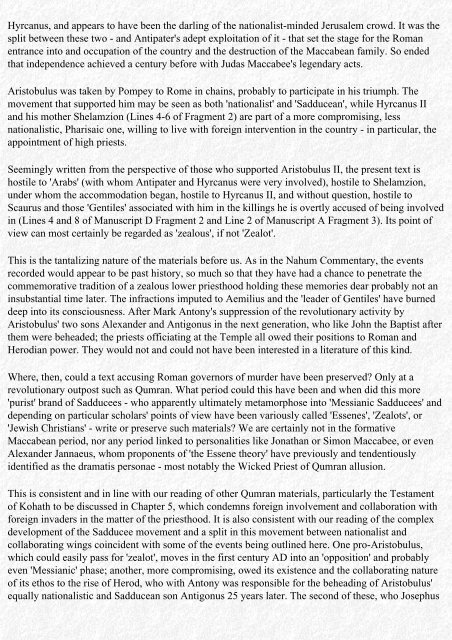Dead Sea Scrolls Uncovered - The Preterist Archive
Dead Sea Scrolls Uncovered - The Preterist Archive
Dead Sea Scrolls Uncovered - The Preterist Archive
You also want an ePaper? Increase the reach of your titles
YUMPU automatically turns print PDFs into web optimized ePapers that Google loves.
Hyrcanus, and appears to have been the darling of the nationalist-minded Jerusalem crowd. It was the<br />
split between these two - and Antipater's adept exploitation of it - that set the stage for the Roman<br />
entrance into and occupation of the country and the destruction of the Maccabean family. So ended<br />
that independence achieved a century before with Judas Maccabee's legendary acts.<br />
Aristobulus was taken by Pompey to Rome in chains, probably to participate in his triumph. <strong>The</strong><br />
movement that supported him may be seen as both 'nationalist' and 'Sadducean', while Hyrcanus II<br />
and his mother Shelamzion (Lines 4-6 of Fragment 2) are part of a more compromising, less<br />
nationalistic, Pharisaic one, willing to live with foreign intervention in the country - in particular, the<br />
appointment of high priests.<br />
Seemingly written from the perspective of those who supported Aristobulus II, the present text is<br />
hostile to 'Arabs' (with whom Antipater and Hyrcanus were very involved), hostile to Shelamzion,<br />
under whom the accommodation began, hostile to Hyrcanus II, and without question, hostile to<br />
Scaurus and those 'Gentiles' associated with him in the killings he is overtly accused of being involved<br />
in (Lines 4 and 8 of Manuscript D Fragment 2 and Line 2 of Manuscript A Fragment 3). Its point of<br />
view can most certainly be regarded as 'zealous', if not 'Zealot'.<br />
This is the tantalizing nature of the materials before us. As in the Nahum Commentary, the events<br />
recorded would appear to be past history, so much so that they have had a chance to penetrate the<br />
commemorative tradition of a zealous lower priesthood holding these memories dear probably not an<br />
insubstantial time later. <strong>The</strong> infractions imputed to Aemilius and the 'leader of Gentiles' have burned<br />
deep into its consciousness. After Mark Antony's suppression of the revolutionary activity by<br />
Aristobulus' two sons Alexander and Antigonus in the next generation, who like John the Baptist after<br />
them were beheaded; the priests officiating at the Temple all owed their positions to Roman and<br />
Herodian power. <strong>The</strong>y would not and could not have been interested in a literature of this kind.<br />
Where, then, could a text accusing Roman governors of murder have been preserved? Only at a<br />
revolutionary outpost such as Qumran. What period could this have been and when did this more<br />
'purist' brand of Sadducees - who apparently ultimately metamorphose into 'Messianic Sadducees' and<br />
depending on particular scholars' points of view have been variously called 'Essenes', 'Zealots', or<br />
'Jewish Christians' - write or preserve such materials? We are certainly not in the formative<br />
Maccabean period, nor any period linked to personalities like Jonathan or Simon Maccabee, or even<br />
Alexander Jannaeus, whom proponents of 'the Essene theory' have previously and tendentiously<br />
identified as the dramatis personae - most notably the Wicked Priest of Qumran allusion.<br />
This is consistent and in line with our reading of other Qumran materials, particularly the Testament<br />
of Kohath to be discussed in Chapter 5, which condemns foreign involvement and collaboration with<br />
foreign invaders in the matter of the priesthood. It is also consistent with our reading of the complex<br />
development of the Sadducee movement and a split in this movement between nationalist and<br />
collaborating wings coincident with some of the events being outlined here. One pro-Aristobulus,<br />
which could easily pass for 'zealot', moves in the first century AD into an 'opposition' and probably<br />
even 'Messianic' phase; another, more compromising, owed its existence and the collaborating nature<br />
of its ethos to the rise of Herod, who with Antony was responsible for the beheading of Aristobulus'<br />
equally nationalistic and Sadducean son Antigonus 25 years later. <strong>The</strong> second of these, who Josephus

















